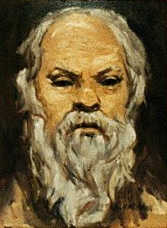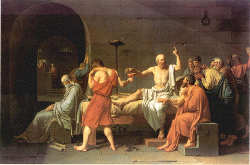Socrates (born
469BC, died
399BC) was a great
philosopher who taught by asking questions. When teachers ask
questions that encourage students to draw conclusions,
they are using the "Socratic method" of teaching. It was
once said that the gods had pronounced Socrates the
wisest of the people because he knew how little he knew.
Socrates asked many questions, but he gave few answers.
He often denied knowing the answers to the questions he
asked.
who taught by asking questions. When teachers ask
questions that encourage students to draw conclusions,
they are using the "Socratic method" of teaching. It was
once said that the gods had pronounced Socrates the
wisest of the people because he knew how little he knew.
Socrates asked many questions, but he gave few answers.
He often denied knowing the answers to the questions he
asked.
Socrates was a well
known teacher in Athens. He drifted around the city with
his students, engaging many people in arguments about
"justice," "bravery," and "piety." Since he was highly
skilled in rhetoric, he often made the leaders of Athens
look foolish. He encouraged his students to reconsider
the old  ways
of doing things.
ways
of doing things.
The leaders of Athens
did not want a critic in their city. They threatened to
bring Socrates to trial for corrupting the youth of
Athens by encouraging them to consider new ideas. The
leaders expected Socrates to leave Athens, but Socrates,
then seventy years old, stayed and stood trial. In 399BC,
Socrates was found guilty and forced to drink a poison
called hemlock.
 who taught by asking questions. When teachers ask
questions that encourage students to draw conclusions,
they are using the "Socratic method" of teaching. It was
once said that the gods had pronounced Socrates the
wisest of the people because he knew how little he knew.
Socrates asked many questions, but he gave few answers.
He often denied knowing the answers to the questions he
asked.
who taught by asking questions. When teachers ask
questions that encourage students to draw conclusions,
they are using the "Socratic method" of teaching. It was
once said that the gods had pronounced Socrates the
wisest of the people because he knew how little he knew.
Socrates asked many questions, but he gave few answers.
He often denied knowing the answers to the questions he
asked.
 ways
of doing things.
ways
of doing things.